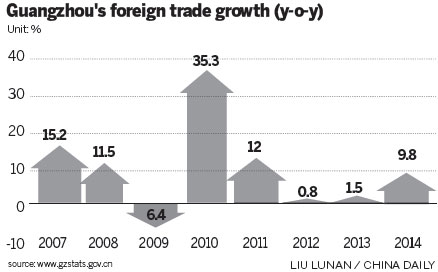
Guangzhou will continue to develop new business models to boost its foreign trade, the city's mayor Chen Jianhua said on Monday。
In a government work report for the local people's congress, which opened on Monday, Chen said priority sectors to benefit from new models would include cross-border e-commerce, leasing and duty-free logistics。
"We will also provide one-stop services for international trade by integrating services from customs and inspection and the quarantine authorities for customs declaration, inspection and clearance," said Chen。
The capital of Guangdong province's foreign trade surged 9.8 percent year-on-year to $130.6 billion in 2014, compared to 1.5 percent in 2013 and 0.8 percent in 2012, thanks to an improved trading environment and efforts at building closer links with countries and regions along the ancient Maritime Silk Road, Chen said。
The city's total export value also grew rapidly, by 15.8 percent year-on-year to $72.7 billion in 2014, according to the government work report。
"New business models have been playing a growing role in trade growth, given that the city's traditional trade markets have been experiencing drops in demand," Chen said。
The city's cross-border e-commerce trade reached 1.31 billion yuan ($209.3 million) in 2014, according to the report。
Guangzhou was joined in 2013 by the major Chinese trade cities of Zhengzhou, Shanghai, Chongqing, Hangzhou and Ningbo as pilot cities to introduce cross-border e-commerce services。
After the rebound in its foreign trade, the city has set a 10 percent target for import and export growth for 2015.
"We will expand the export of advanced equipment, key components and bulk commodities," Chen said。
The establishment of a free trade zone in the city's Nansha district is also expected to help boost its foreign trade。
"The zone will create a series of preferential policies for trade, which will benefit local exporters," said Jiang Weikai, president of Golden Sea Professional Equipment Ltd, a major Guangzhou-based provider of professional lighting equipments, which realized a 20 percent increase in trade last year。
The free trade zone of Nansha, part of Guangdong's Free Trade Zone, which also includes Hengqin in Zhuhai and Qianhai in Shenzhen, was approved by the central government at the end of last year。
Jiang, also a deputy to the local people's congress, said a healthy trade environment for local exporters should also be created。


















































